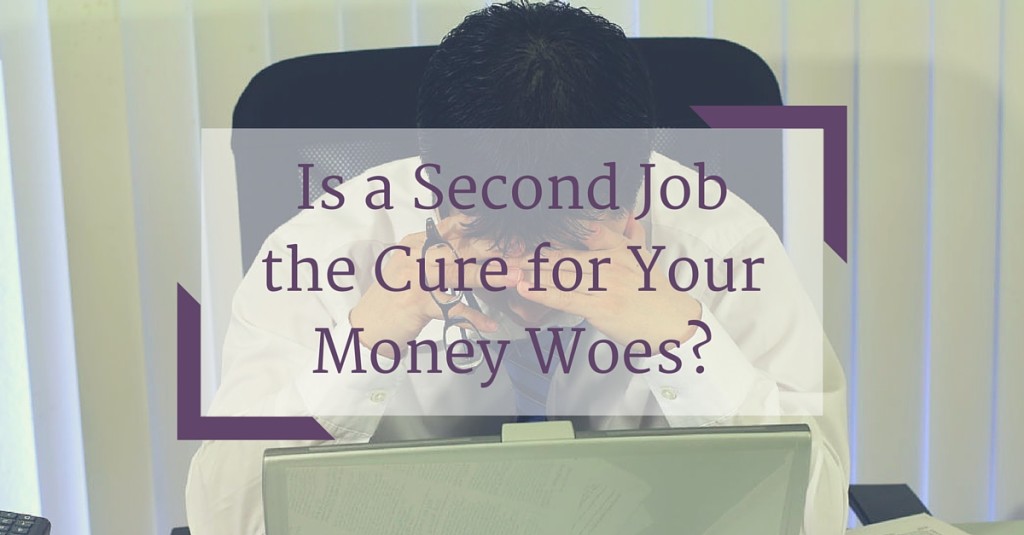Being in debt is like being overweight; you’ve got too much of a thing you want to get rid of. As with losing weight, the way to get out of debt is a simple equation – spend less money than you make.
There are only two ways for that equation to work, and those involve spending less or making more.
Spending less smacks of deprivation because it means limiting the things you love. Making more, on the other hand, sounds more palatable.
Personal finance experts such as Dave Ramsey extoll the virtues of working a second job. People who write about getting out of debt would have you believe there’s nothing better than the proverbial side hustle, a temporary or part-time job that allows you to pick up some much needed cash and have a fun experience at the same time.
Americans are listening to this advice, with the Bureau of Labor Statistics reporting that nearly 5 percent of workers hold down 2 or more jobs. Though the figures have been rising since the Great Recession, working multiple jobs has long been seen as a mark of a hard worker who’s looking to get ahead.
Back when I was starting my law practice and needed to keep a roof over my head, I had a series of second jobs. I’d do word processing at night, covered hearings for other lawyers in my spare time, and reviewed piles of real estate documents cluttered offices without windows.
I knew it was a short-term situation because my practice would either take off or I’d go get myself a “real job” working for another lawyer. Thankfully I was able to stop juggling after 18 months, but that was long enough for me to see exactly why a second job might not be the right move for everyone.
Here are some of the costs to consider before taking on a second job.
- Less Time for Family. If you’ve got kids, forget seeing those soccer and baseball games. Evenings by the television with your spouse are also off the table.
- Greater Chance of Fatigue and Injury. If you’re working a full-time job during the day, you’ve got plenty of time for rest and relaxation. Taking on night or evening work is going to cut into your ability to relax and recharge, and you may find that you’re a bag of sleepiness after a short time. In fact, a 2014 study by the Center for Injury Epidemiology at the Liberty Mutual Research Institute for Safety shows that those holding multiple jobs may be at greater risk for fatigue compared with those who hold one job because they work more work hours per week; have longer daily commute times; and have less sleep and leisure time left in the week to recover. Previous studies found those with multiple jobs also have a higher risk of injury
- Limited Promotion Opportunities. When you’re working a single full-time job it’s easier to focus on doing your best work. You can focus on the tasks at hand, juggle your responsibilities, and improve the skills necessary to move you up the ladder. You also have more time to socialize with coworkers, which encourages teamwork and increases your chances of getting a promotion. If you’ve got a second job that’s eating your time, however, those chances disappear.
- Your Income May Go Down. Does your full-time job offer the chance for overtime? Having a second job means saying goodbye to those extra hours of regular income, often paid at a premium. That’s to say nothing of the fact that your boss will see you as a clock watcher rather than a team player who’s willing to help out whenever possible. Unless your side hustle pays better than your main job, your wallet could end up lighter.
- It May Get You Fired. Some employers have policies about taking on a second job, either limiting which ones you can take or prohibiting them entirely. Before you venture out into the world of the side hustle, be sure it won’t cost you that full-time employment.
- Your Health May Suffer. Working two jobs means less time to exercise (unless your second job involves exercise, that is). In fact, working the night shift has been proven to lead to weight gain and diabetes.
- Your Expenses May Rise. When you shuttle back and forth between two jobs, you’ve got to tack on extra expenses for gas money and food because you may not be able to eat at home as often. For positions that require you to dress properly, laundry and clothing costs may also go up.
I’m not saying it’s a bad idea to get a second job as a way to pay off your debt, just that you shouldn’t dive head first into a side hustle without giving it some extra thought.
As a short-term solution to a short-term problem, the costs may be worth it. If you’re young, otherwise unattached and are just starting out in your career then, like me, a second job may be the right move for you.
But understand that you can work multiple jobs for only so long before the stress of constantly juggling the increased responsibilities gets to you. If you’ve got household obligations or a family depending on you to be there physically and emotionally, that breaking point may come too soon – and with too high a price to pay.
